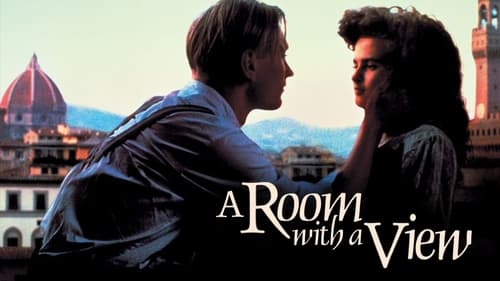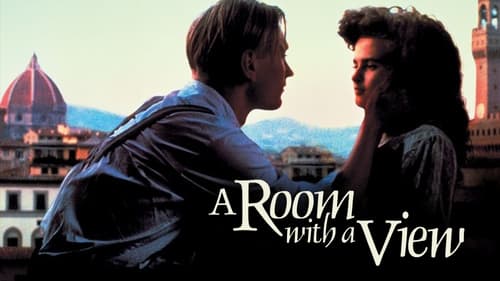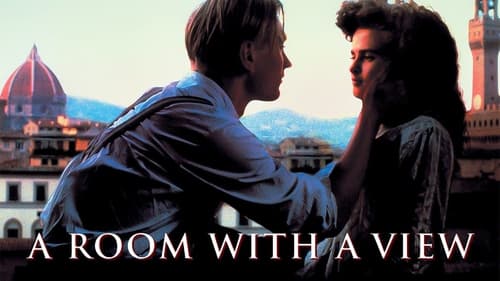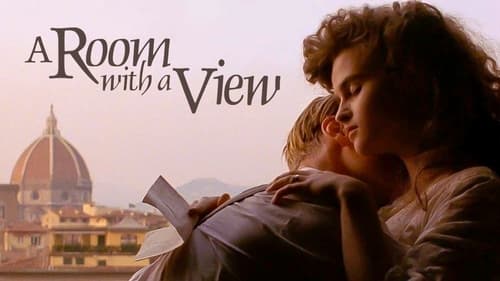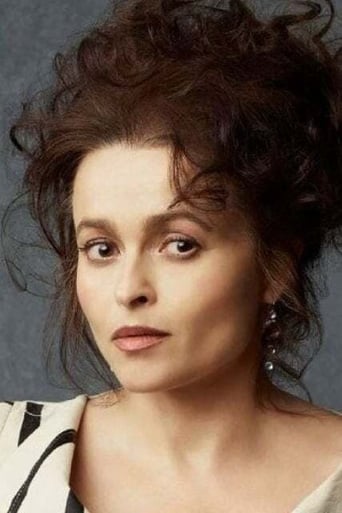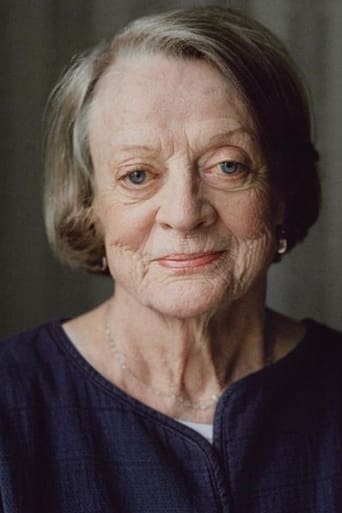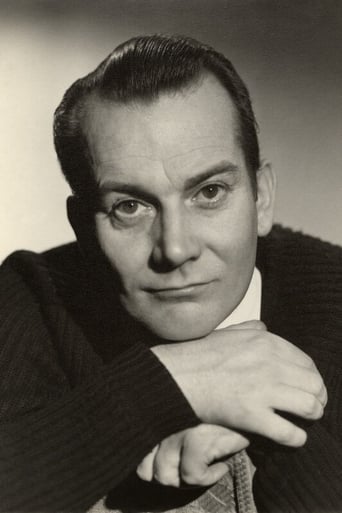Dorathen
Better Late Then Never
Comwayon
A Disappointing Continuation
Ketrivie
It isn't all that great, actually. Really cheesy and very predicable of how certain scenes are gonna turn play out. However, I guess that's the charm of it all, because I would consider this one of my guilty pleasures.
Bob
This is one of the best movies I’ve seen in a very long time. You have to go and see this on the big screen.
lasttimeisaw
A revisit of this resplendent Merchant-Ivroy-Jhabvala costume porn, A ROOM WITH A VIEW, has wondrously retained its entrancing lusciousness in the wake of the impeccable restoration. Spending a belle-époque vacation in Florence, young English lady Lucy Honeychurch (Bonham Carter), hailed from an upper-middle class upbringing, is chaperoned by her elder cousin Charlotte Barlett (Smith), meets a sundry of compatriots in their pensione, among which, Mr. Emerson (Elliott) and his son George (Sands), express their willingness to exchange their rooms with the ladies' upon Charlotte's grievance that their rooms don't have a view. A gesture with benevolence is met with Charlotte's utter dismay, who is ingrained in her straitlaced head space and constantly clashes with Lucy's more open-minded temperament falling in with the story's turn-of-the-century ethos. The pair's Florentine sojourn is topped off by an impulsive kiss from George with Lucy in its receiving end during a rural sally, what would have happened next (nudge nudge wink wink) is successfully pre-empted by Charlotte's intervention, and the scandal is sworn of secrecy by both Lucy and Charlotte, but little do we know, one of them cannot keep that promise and the other would be fallen under the magic spell, of such a banal but passionate kiss. The next chapter spirits Lucy away to her home turf, where she consents to the engagement with a pedantic gentleman Cecil Vyse (Day-Lewis), but due to a quirk of fate (or rather, its author E.M. Forster's novelistic licence), George and his father materialize themselves as the new tenants of a cottage in the same village, their settlement wrong-foots a seemingly contented Lucy, and ripples of that previous impulse (accentuated by George's constant presence) actuates Lucy to rethink her nuptial decision and for the first time, acknowledges to her true feelings which will find her the fulfillment that breaches the entrenched class barrier. Consequentially, A ROOM WITH A VIEW is blessed with a cracking dramatis personae, Maggie Smith, in her another terrific Oscar-nomimated showcase that significantly solidifies her priggish spinster screen persona of her later career, self-consciously warbling her way through her passive-aggressive stock-in-trade, but when subjected to the pitfall of becoming a laughingstock, she will plough on with a tenacious obliviousness that remarkably intimates how hard for a woman of her bearings to survive (apparently) unscathed under such a snooty milieu.BAFTA favorite Denholm Elliott bags his once-in-a-lifetime Oscar nomination as the solicitous, agreeable Mr. Emerson, but by my lights, the champ among supporting actors (against a fierce competition from Elliott, Simon Callow's exceedingly personable and responsive Reverend Mr. Beebe, the mascot of the film, and Julian Sands' flash-in-the-pan raffish brio), is none other than Mr. Day-Lewis, stylishly out of step with the repugnant stereotype of a high-brow, conservative scion, even he is not cut out for Lucy, one certainly feels sorry for him when he accepts his defeat in a gentlemanly manner, which effectively salvages the supposedly most antipathetic character in the story and purveys Cecil a dignified, yet rather touching sheen that is not present in the book. While Maggie Smith is unequivocally the cherrypick among the film's petticoat players, one would be too remiss to not mention Judi Dench's novelist Eleanor Lavish, who shares most of her scenes with Smith (for stanned fans, it marks a monumental moment!), taking in her stride spirited convos that triumph the Bechdel test (but not above tittle-tattling), also Rosemary Leach has a good run as Lucy's patrician, nonplussed mother, but it is quite a slight that a 18-year-old Helena Bonham Carter is left without much fanfare in her stunning film debut, who stoutly holds her own against any member of these more experienced thespians, only if her final liberation doesn't lead to a faintly saccharine revisit of Florence with her beau, but a new perspective on her own life and role in a larger context, as an independent woman who doesn't suppress her feelings and thoughts, perceives the world with an upgraded awareness, that would be a more perspicacious ending for today's viewers. In the event, A ROOM WITH A VIEW is a nonpareil British drama-comedy, souped up by scrumptious trimmings aplenty (cinematography, costume, music, production design and a collective fusillade of hallmark elocution), where Victorian formality fighting a losing battle with Edwardian enlightenment, and the Merchant-Ivroy-Jhabvala trinity's best work!
James Hitchcock
"A Room with a View" was part of the great E. M. Forster cycle of the eighties and early nineties when, starting with David Lean's "A Passage to India" from 1984, five of his six novels were turned into films. Three of these- this one, "Maurice" and "Howard's End"- were directed by James Ivory and produced by Ismail Merchant. Some films bear little resemblance to the books on which they are ostensibly based, but Merchant and Ivory follow their literary source quite closely, even dividing the film into sections corresponding to Forster's chapters.The film is set in during the Edwardian period in England and Italy, although all the major characters are English. The plot can be summarised as "two boys love one girl". The girl is Lucy Honeychurch, daughter of a wealthy upper-middle class English family. The boys are her fiancé Cecil Vyse and George Emerson, a handsome young man whom she meets on holiday in Italy.Forster was touching on a theme with which he was to deal at greater length in his next novel, "Howard's End", a theme which was also a preoccupation of his German contemporary Thomas Mann, namely the contrast between the "artistic" and "bourgeois" attitudes to life. In "Howard's End" the two sides are represented by the cultured Schlegel family (with whom Forster's sympathies clearly lie) and the solidly Philistine Wilcoxes. Here, however, the emphasis is rather different. The artistic side is represented by Cecil, a supercilious cultural snob whom Forster may have been using to satirise the pretensions of the Aesthetic Movement. Although the bourgeois Honeychurches can also be snobbish, they are less pretentious, and Lucy herself, a gifted pianist with a passion for classical music, is far from uncultured. (The same cannot, however, be said for her mother Marion and her loud, brash brother Freddy).Another important theme is the way in which the values of the old century are giving way to those of the new. The old Victorian era is associated with adherence to social convention and emotional repression, the new Edwardian one with a more free-spirited and emotionally liberated attitude. This distinction is not, however, necessarily the same as the difference between old and young. There are free-thinking, unconstrained older people, such as George's eccentric father, and more emotionally reticent younger ones, such as Lucy who finds it difficult to give free expression to her feelings, at least in words. (She has no problem in expressing them through her music).The two performances I liked least came from Denholm Elliott and Julian Sands as the two Emersons, father and son. I know that Elliott tried hard to make old Mr Emerson lovably unconventional, but I was left with the impression that he would have been unbearably irritating in real life. Sands came across as pleasant but a bit too bland for the hero of a romantic drama. I certainly could have done without that scene in which George, Freddy and the local vicar all splash about naked in a pool, a heavy-handed way of emphasising the young men's boisterousness and free spirits.On the positive side, I liked Helena Bonham-Carter as Lucy, Maggie Smith as Marion's uptight cousin Charlotte who acts as Lucy's companion and chaperone in Italy, and Daniel Day-Lewis as Cecil. Bonham-Carter was at the start of her acting career, but she gave great promise for the future. (She was to become something of a specialist in period dramas and appeared in two more Forster adaptations, "Where Angels Fear to Tread" and "Howard's End"). On the surface, Cecil seems to be a one-dimensional character, a caricature of the self-satisfied and opinionated culture-vulture, but Day-Lewis is able to suggest that this surface may be a mere façade. Cecil's aestheticism may be just another form of emotional repression. He has no problem with expressing his views on art or literature, but expressing his deeper feelings is another matter. When Lucy breaks off her engagement to him on the grounds that he has no deeper feelings, at least for people as opposed to objects, I felt she may have been doing him an injustice.As one might expect from Merchant/Ivory, the film is visually beautiful and makes good use of its location settings, whether in Florence or in the Kent countryside. (Lucy's home village, Summer Street, is supposedly in Surrey but these scenes were actually shot in Chiddingstone, Kent). It also makes good use of music, especially Puccini's aria "O My Beloved Father" (perhaps less over-familiar in the mid-eighties than it is today) which sounds wonderfully appropriate to the Italian settings, even if it was not written until a decade after Forster's novel.One criticism I have heard of the film is that "nothing happens". Although it is certainly true that there is little in the way of physical action, and fewer dramatic developments than in, say, "A Passage to India" or "Howard's End", this is not a criticism I accept. On an emotional level there is actually a lot going on. As roger Ebert pointed out, "It is an intellectual film, but intellectual about emotions: It encourages us to think about how we feel, instead of simply acting on our feelings". This sort of emotional intelligence is not always easy to convey in the cinema- it is probably easier to do it via the written word- but I think that Merchant and Ivory succeed in doing it here. 8/10 A goof. There is a curious inconsistency about the pronunciation of Cecil's name. Most of the characters pronounce it as "Sissil", but George insists on "Sessil", even though he knows Cecil personally. Also, "Powell" (the name of one of the servants) is pronounced by some characters to rhyme with "Cole" and by others to rhyme with "Cowell".
Kirpianuscus
not the theme, not the acting, not the story. but the fascination in front with a meet. this defines this jewelry who, far to be surprising , James Ivory is almost predictable, is charming at all. short, it is a meet between James Ivory and E.M. Forster.nothing more. but this small detail, the performances, the air of an golden age, the great job of Daniel Day - Lewis, the Italian air who brakes the screen, all does "A Room with a View" more than an adaptation. but a travel. and this feeling remains fresh for a long time. because it is a story about emotions and freedom and art and happiness. one of the most simple stories about each subject. but adorable, seductive and fascinating. maybe lovely. and this is the secret for not only see it. but admire it. that is all.
edwagreen
You don't need much room to view this disappointing 1985 film. The problem is that with the exception of Maggie Smith, who gives new meaning to spinsterhood, the characters are unbelievable in this brooding Merchant-Ivory piece set in the Victorian era.Daniel Day-Lewis comes off as a fop or dandy; even though he is engaged to Helena Bonham Carter here. She finds true love in Italy and it follows her back home in England.The film often drags The scene with the naked men was funny but the result was highly predictable.The men in particular are really off the wall in this film.




